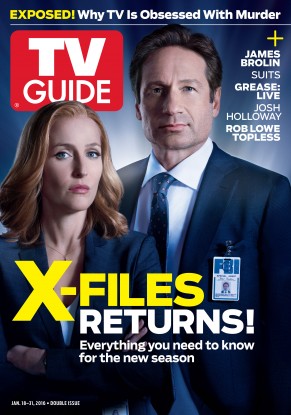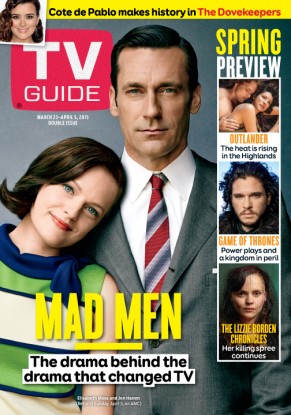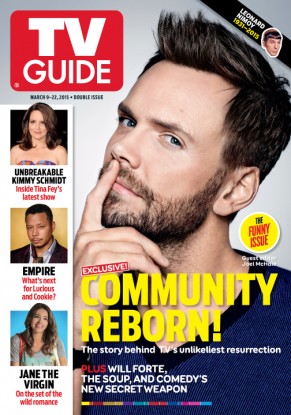The X-Files Returns! Mulder and Scully Are Back on the Case
David Duchovny is clad in the classic FBI G-man outfit: government-issue blue shirt with a short red tie. Sitting behind a large metal desk, he leans forward, picks up a pile of pencils and, one by one, starts throwing them at a familiar poster. You know the one.
Bankers’ boxes stuffed with folders marked “X-Files” line the wall. Slapped on a small door is a nameplate designating this the office of Fox Mulder. After a few throws, one of Duchovny’s pencils sticks, right above the words I WANT TO BELIEVE. He points to it proudly. Soon, he’s making the shot consistently: “I can go pro,” he jokes.
Anything is possible, including the return of The X-Files, shooting six new episodes to premiere on Fox following the NFL’s NFC championship game on Sunday, January 24. (The show moves to its regular timeslot—Mondays at 8/7c—the next day.)
On a breezy July day, in an abandoned mental hospital just outside of Vancouver, Duchovny (Mulder) and Gillian Anderson (Dana Scully) have been transported back to the basement of the FBI headquarters in Washington, D.C.
A lot has happened in the 22 years since Mulder the truther and Scully the skeptic first paired up to investigate unexplainable paranormal phenomena. For one thing, an older and wiser Mulder is wrestling with the kind of doubt that comes with having seen everything yet still having no answers.
“I’m a middle-aged man,” he tells Scully while tossing out X-Files cases that have since been revealed as publicity stunts, frat pranks and practical jokes. “And I’m finding it hard to maintain the enthusiasm of my youth. Is this really how I want to spend my life, chasing monsters?”
Cue the chorus of several million X-Files fans, all screaming in unison, “Yes!”
The X-Files, which aired from 1993 to 2002, had been dormant ever since the second film, released in 2008, was met with lukewarm response. Creator Chris Carter, who spent much of the last decade exploring other pursuits (including a fellowship at the Kavli Institute for Theoretical Physics at the University of California at Santa Barbara), wrote a third movie—which has yet to see the light of day.
“It wasn’t as if I let those characters go for eight years,” he says. “I was noodling. Every time I open up the newspaper, I see a new X-Files story. I’ve been doing it for so long, it’s a part of my thought process.”
But after the last movie disappointed, 20th Century Fox’s film studio wasn’t interested in another X-Files installment. “We thought it was probably over,” says Duchovny. “That was disappointing. However dark The X-Files got, there was always a tone of wonder and hopefulness, in a way that I think the last movie lost hold of. It was merely dark. If you wanted to end The X-Files, that was not the way to end it.”
Anderson agrees: “It wasn’t the right way to go out. It would be nice if there were some kind of closure.”
The idea of bringing The X-Files back wasn’t on their minds when Duchovny, Anderson, Carter and many of the producers gathered on stage in 2013 at a standing-room-only Comic-Con panel organized by TV Guide Magazine. Yet it was there that the seeds were planted.
“We had lunch with Chris, maybe in September or October after that panel,” says Fox Television Group chairman Dana Walden. “I think after Comic-Con he realized that the appetite is as great as ever. We broached the idea of doing an event series.”
The stars were game once they realized Fox wasn’t asking for many episodes. “Both of us were like, ‘There’s no way we’re going to do [13],’” Duchovny says.
Still, Carter was busy with his Amazon Prime Video show The After (which was later scrapped), while Anderson and Duchovny were starring on other TV shows.
“We were probably in the planning stage for about a year before everyone got on the same page,” Walden says. “Gillian lives in the U.K., David lives in New York and Los Angeles and Chris is here in L.A. It was hard finding a window that they could all be together in the same city. Putting all the pieces together was just so challenging. Not until we had a signed deal did I feel 100 percent certain that this was a reality.”
Carter decided to write and direct three of the six episodes and brought on X-Files vets Glen Morgan, Jim Wong and Darin Morgan to write and direct one each. “There’s a little bit of excitement, some trepidation and some nervousness,” Darin Morgan says. “It’s hard to know what the reaction is going to be.”
Ultimately, Carter decided to put a new twist on the show’s alien-invasion mythology. What if it was the government, and not an alien life-form, that was behind some of the world’s biggest unexplained events? “My feeling was this had to follow perfectly from where the original series left off, but it didn’t necessarily have to take everything as gospel that had come before,” he says.
Community’s Joel McHale stars in the first episode as Tad O’Malley, a Glenn Beck–like TV host who traffics in conspiracy—and is a fan of Mulder’s work. “He believes everything Mulder has said, and all those theories, but has made millions of dollars off of it,” says McHale, a longtime fan of the franchise. “It’s one of the most original science-fiction ideas that I have ever read. There’s no rehash here.”
It’s O’Malley who helps trigger a reopening of the X-Files—and a reunion between Mulder and Scully. Indeed, the couple, last seen at the end of the 2008 movie heading into the sunset, have split up in the interim.
But take a deep breath: Duchovny believes Mulder and Scully will eventually get back together. “I think Chris likes to give the fans what they want,” he says. “Personally, I’m way more miserly. I’d be like, ‘Eff you guys, they’re staying apart.’ That’s why I don’t have any friends.”
Plenty of other surprises are in store, including the resurrection of the sinister Cigarette Smoking Man (William B. Davis), who was supposedly killed in the series finale. Hints Carter: “In Episode 6, you’re going to see exactly what the product of that failure to die was.”
Also back from the “dead” is conspiracy trio the Lone Gunmen (Tom Braidwood, Bruce Har-wood and Dean Haglund). “You see them in an interesting way in Episode 5,” Carter teases.
FBI Assistant Director Walter Skinner (Mitch Pileggi) will once again be keeping an eye on Mulder and Scully. Other returning players are FBI Special Agent Monica Reyes (Annabeth Gish, who joined the series in Season 8) and Margaret Scully, Dana’s mother (Sheila Larkin). “I felt that there were certain command performances that you had to meet,” Carter says.
Besides McHale, guest stars this time include Rhys Darby (Flight of the Conchords), Robbie Amell (The Flash), Lauren Ambrose (Six Feet Under) and Kumail Nanjiani (Silicon Valley), who’s such a fan he even hosts a regular podcast about The X-Files. Annet Mahendru (The Americans) shows up in the first episode as Sveta, an abductee who may be the key to uncovering the truth—it’s men, not aliens, she says, who have taken her.
Carter split the six-episode order into two conspiracy episodes (the premiere and finale) book-ending four so-called “monster of the week” episodes. Darin Morgan, known for some of The X-Files’ most irreverent episodes (including the Emmy-winning “Clyde Bruckman’s Final Repose”), brushed off an old classic monster-movie concept of his to pen the third installment, “Mulder and Scully Meet the Were-Monster.” “There are quite a lot of nods that longtime fans will get,” he says. It’s this episode where Mulder faces a bit of a midlife crisis. “Mulder’s at that stage where he’s back, but he’s not sure if it’s really all worthwhile,” he adds. “Hopefully by the end of the episode that fire has been reignited in him.”
Back on set, Darin Morgan is directing a classic Mulder-Scully back-and-forth as the characters dissect a corpse. Suddenly a cell phone rings, ruining the shot. It’s coming from the pants pocket of the actor playing the stiff. As if he were answering the phone, Duchovny quips, “Dead man’s ass!”
The stars are clearly enjoying this revisit. “The most fun part,” Duchovny says later, “is just doing this thing again that we do. There weren’t really any missed beats. It’s just a weird thing we can fall into.”
Carter hopes the hard-core fans are satisfied, and since much is left unresolved at the end of Episode 6, another miniseries is possible. “I initially had an expectation that six would be it,” Anderson says. “I had no interest in doing any more. I’m a bit more open to the idea.”
Adds Duchovny: “We acknowledge the place the show has in our lives and our careers. It’s a cornerstone. But it can’t ever be the centerpiece of our lives again. If we can figure out a way to do it [as an occasional event], then I think I’d like that.”
- Lost‘s Josh Holloway and The Walking Dead‘s Sarah Wayne Callies team up for the USA thriller Colony
- James Brolin opens up about his new Life in Pieces
- Meet the Real Housewives of Potomac
- Plus: Making a Murderer, Suits, The 100, Grease: Live and more



